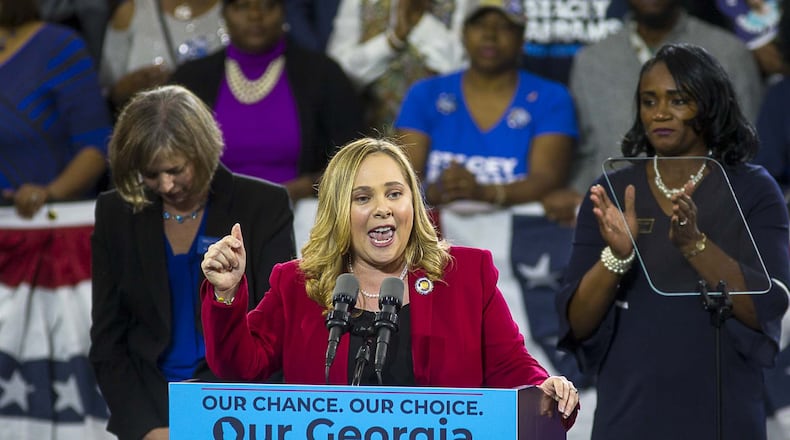One of the nation’s biggest car haulers, led by a former candidate for Georgia lieutenant governor, filed for bankruptcy court protection late Tuesday, citing auto industry challenges, steep labor costs and $2 billion in potential pension liabilities.
Sarah Riggs Amico, who ran unsuccessfully as the Democratic nominee for lieutenant governor last year and is considering running for the U.S. Senate seat held by Republican David Perdue, is executive chairperson of Jack Cooper Ventures. The trucking company, which delivers vehicles for some of the biggest carmakers in North America, has its executive offices in Kennesaw and headquarters in Kansas City, Mo.
Amico and her family have had voting control of the business. But that looks like it won’t last.
A plan worked out with lenders and other interested parties would leave her as part of the management team, though no longer a major owner in the company. A lender, New York-based hedge fund Solus Alternative Asset Management, intends to take over that position.
The trucking company’s 3,000 employees, most of whom are union members, would keep their jobs and avoid wage or health benefit cuts under the plan, Amico told The Atlanta Journal-Constitution.
At the same time, the company would shed more than $300 million in debt as part of a deal to sell all or virtually all of its assets, according to a press release from the business.
Jack Cooper Ventures also would limit its potential liability for the Central States Pension Fund, a teetering nationwide pension supported by 1,400 employers and covering nearly 400,000 union workers and retirees. Central States has become a prime example of overextended U.S. retirement systems with soaring funding needs, a growing base of a retirees, fewer active workers and concerns about running short of money needed to pay promised benefits.
While the federal Pension Benefit Guaranty Corporation insures most company pensions, the part of the program that backs up multi-employer pension plans, like those created with unions, is deeply underfunded and could fall short of fully funding benefits by 2025 if big systems falter.
Last month, the Democrat-controlled U.S. House passed a bill to support the most troubled pensions with forgivable loans. Passage by the Republican-dominated Senate appears far from certain amid concerns about costs.
In its bankruptcy filing, Jack Cooper Ventures said it could face $2 billion in liabilities if it attempted to withdraw from Central States. Under the plan worked out before the filing, the trucking company would move to a part of the fund not saddled with the steep withdrawal fees.
In addition, the company would be allowed to cut its weekly per-employee contributions to Central States by more than half. The savings are slated to be reinvested in new equipment for the business. Workers would receive all the retirement benefits they already accrued and would be in a more stable pension. But, going forward, they would earn new retirement benefits at a much slower rate.
“This is a difficult process but this is also a very good story about how you save jobs and put a company on the right path,” Amico said in an interview.
A spokesperson for the International Brotherhood of Teamsters, which represents employees at the company, was not available for comment.
A notice from a Teamsters negotiating committee described the proposed changes as a way to save jobs.
The shifts would need approval from Teamster locals’ leaders and members. The committee wrote that it had been informed that rejection of the offer “will lead to the company being sold piecemeal or liquidated resulting in the loss of virtually all jobs.”
With the challenges faced by the company, Amico said her focus is on that, not a decision on whether to run for the U.S. Senate.
Nonetheless, she said she intends to speak out about the nation’s looming pension and retirement issues and will push lawmakers to act.
Kerwin Swint, the director of Kennesaw State University’s School of Government and International Affairs, said the bankruptcy issue “is an incredible distraction for someone thinking about getting in a competitive statewide race.”
While Amico can try to put the filing in a positive light, “it’s an added layer of issues and explanations” for a potential campaign, he said.
Amico lost her bid for the lieutenant governor seat against Republican Geoff Duncan. The Georgia Supreme Court is considering a legal challenge that contends tens of thousands of votes may have gone uncounted.
Amico’s father, Michael Riggs, began acquiring hauling companies in 2008. The family purchased Jack Cooper about a year later and bought other challenged trucking businesses. Riggs serves as Jack Cooper’s chief executive.
Revenues for the company have declined in recent years, and now fall below $600 million. Trade publication Transport Topics ranks Jack Cooper as the second largest car hauler in North America, down from the top spot.
It may fall farther.
As one of only two major unionized U.S. car haulers, Jack Cooper Ventures’ “unsustainable labor costs have made it impossible for the Debtors to compete with the increasing number of lower-cost, non-unionized companies,” according to the company’s bankruptcy court filing.
The company also said it has been hurt by flat or declining auto sales and the shrinking market share of big Detroit-based car makers that have historically had strong ties to unionized carriers. In addition, Toyota, which had been one of its biggest customers, has moved most of its business to lower cost haulers.
Cutting debt and reducing other costs will allow a new owner to invest in updating most of the company’s aging truck fleet, the company said.
About the Author
The Latest
Featured



